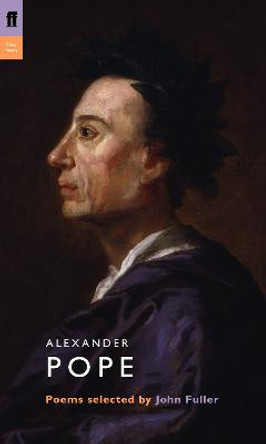Description
As a young man Pope shot to fame with The Rape of the Lock, a light-hearted mock-heroic poem about a trivial society scandal, still his best remembered work. Wit and irony, dazzling technical mastery - he perfected the English heroic couplet - acute social observation and insight into human nature were to become the hallmarks of his verse.
Pope is one of the most quoted of English poets - 'For Fools rush in where Angels fear to tread', 'A little learning is a dangerous thing', 'To err is human, to forgive, divine', all originate from his pen. While his poetry generally has suffered some neglect in recent decades, Professor Claude Rawson's selection persuasively demonstrates why it should be back in fashion.
He aspired to make out of verse satire a serious and dignified form, and his culminating work, The Dunciad, achieves a tragic gravity which transcends its satirical mockeries. An elevated and ironic reflection on culture, it created a new genre which led eventually to the modern masterpiece of T. S. Eliot's The Waste Land.
Pope was a precocious talent and anxious to advertise the fact, inserting such subtitles as "Done by the Author at 12 years old" into his early published poems. He adopted many poetic forms, and this anthology includes graceful and witty lyrics, verse letters to friends in the Horatian mode, a number of devotional poems, and a variety of important discursive poems on literary and political themes, including An Essay on Criticism, Windsor-Forest, and An Essay on Man.
This edition uses the text of the Oxford Standard Authors edition by Herbert Davis of Pope's Poetical Works, 1966. Complete poems rather than excerpts have been selected. The beautifully typeset text is enhanced by illustrations by William Kent from the first edition of The Dunciad.
Alexander Pope (1688-1744) was not only the greatest poet of his age but also one of the greatest English satirists of all time. This pocket anthology is an excellent introduction to his verse.
About the Author
Alexander Pope was born on 21st May 1688.He was brought up a Roman Catholic at a time where the laws of England were prejudicial towards Catholics. He suffered tuberculosis as a child and was crippled by it. He never grew taller than 4'6". He first published The Rape of the Lock when he was twenty-three years old in 1712. He later added to it in 1714 and 1717. It was written to reconcile two families who had fallen out over a similar incident where a young Lord Petre had cut off a lock of hair from Arabella Fermor's head. Pope went on to translate the works of Homer and produce The Dunciad and An Essay on Man. Pope died on 30th May 1744.
Reviews
Readers and writers today can't, of course, share Pope's certainties of taste. But we can apply some of his principles, the most important of which is, perhaps, that principles are necessary. -- Carol Rumens * Guardian *
For us, satire is merely being rude about people, in the manner of Private Eye or Spitting Image. For Pope, satire meant not only denigrating some values, but suggesting what other values might stand in their place: George II is an idiot, but a good monarch would support the arts and literature as the emperor Augustus did. The key to Pope's art is the ideal of balance, and it is a mistake to isolate one moment without seeing how he brings a counter-element into play.... On a larger scale, Pope often uses an alternative way of thinking to create what later thinkers would call an epiphany. -- Philip Hensher
Book Information
ISBN 9781841598154
Author Alexander Pope
Format Hardback
Page Count 288
Imprint Everyman's Library
Publisher Everyman
Weight(grams) 250g
Dimensions(mm) 167mm * 118mm * 20mm






